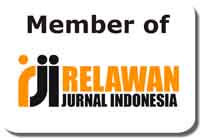Developing Reading Arabic Skills Among University Students in South Sulawesi
Abstract
Keywords
Full Text:
PDFReferences
Alkahtani. (2022). The Role of Parents in Teaching Arabic Language Skills (Reading and Writing) to Primary School Students in the Corona Pandemic Crisis. Information Sciences Letters, 11(6), 1973-2003. https://doi.org/10.18576/isl/110613
Abdallaoui Maan, N. (2021). Improving Arabic reading ability and acquiring ICTs skills of a newly-literate adult learner. Studies in the Education of Adults, 53(1), 23-41. https://doi.org/10.1080/02660830.2020.1791521
Abdallah, A. (2021). Impact of Using Parallel Text Strategy on Teaching Reading to Intermediate II Level Students. International Journal on Social and Education Sciences, 3(1), 95-108.
Abdulrahaman, M. D., Faruk, N., Oloyede, A. A., Surajudeen-Bakinde, N. T., Olawoyin, L. A., Mejabi, O. V., ... & Azeez, A. L. (2020). Multimedia tools in the teaching and learning processes: A systematic review. Heliyon, 6(11), e05312.
Afifah Akmalia, Moh. Ainin, & Irhamni. (2023). The Two Stay Two Stray Learning Strategy and Its Effect on the Motivation and Ability of Arabic Reading Skills. Journal of Higher Education Theory and Practice, 23(12). https://doi.org/10.33423/jhetp.v23i12.6245
Al-Janaideh, R., Tibi, S., Gottardo, A., Paradis, J., & Chen, X. (2023). Morphology and Reading Skills in Arabic-Speaking Syrian Refugee Children. Reading Research Quarterly, 58(3), 391-405. https://doi.org/10.1002/rrq.495
Almsbhieen, M. M., Aljazi, S. F. F., Alhasanat, H. A. A., & Rababah, M. A. (2023). The effect of active learning strategies on developing oral reading skills in low-achieving native-speaker Arabic students. International Journal of English Language and Literature Studies, 12(4), 384-400. https://doi.org/10.55493/5019.v12i4.4923
Alshahrani, A. (2023). The Contribution of Rapid Automatized Naming Skills and Phonological Awareness to Arabic Language Reading Fluency: A Path Analysis. PSYCHOLINGUISTICS, 33(1). https://doi.org/10.31470/2309-1797-2023-33-1-26-40
Asadi, I. A., Kasperski, R., & Sarid, M. (2023). The cumulative effect of socioeconomic status and dyslexia on linguistic, cognitive and reading skills among Arabic-speaking children. Dyslexia, 29(2), 78-96. https://doi.org/10.1002/dys.1735
Asadi, I. A., & Kawar, K. (2023). Learning to Read in Arabic Diglossia: The Relation of Spoken and Standard Arabic Language in Kindergarten to Reading Skills in First Grade. Literacy Research and Instruction, 1-17. https://doi.org/10.1080/19388071.2023.2217274
Burger, J., Bellhäuser, H., & Imhof, M. (2021). Mentoring styles and novice teachers' well-being: The role of basic need satisfaction. Teaching and Teacher Education, 103, 103345.
Hobson, A. J., & van Nieuwerburgh, C. J. (2022). Extending the research agenda on (ethical) coaching and mentoring in education: embracing mutuality and prioritizing well-being. International Journal of Mentoring and Coaching in Education, 11(1), 1-13.
Ismail, S. M., Wang, C., & Jamalyar, R. (2023). The impact of task-based instruction on learners' reading comprehension, L2 grit, anxiety, and motivation for L2 reading. Asian-Pacific Journal of Second and Foreign Language Education, 8(1), 42.
Khoury-Metanis, A., & Khateb, A. (2022). Exploring the writing-reading connection among Arabic-speaking kindergarten children: the role of fine motor skills and orthographic knowledge. Reading and Writing, 35(7), 1525-1547. https://doi.org/10.1007/s11145-021-10235-5
Layes, S., Lalonde, R., & Rebai, M. (2019). Effects of an Adaptive Phonological Training Program on Reading and Phonological Processing Skills in Arabic-Speaking Children With Dyslexia. Reading & Writing Quarterly, 35(2), 103-117. https://doi.org/10.1080/10573569.2018.1515049
Makhoul, B., & Sabah, K. (2019). Academic Vocabulary Knowledge and Reading Comprehension Skills Among Seventh-Graders in Arabic as L1. Journal of Psycholinguistic Research, 48(4), 769-784. https://doi.org/10.1007/s10936-019-09630-5
Muslim, B., Zikrina, Z., & Mukhlisah, M. (2023). Tațwir Kitāb al-Qirā'at al-Rasyīdah li Tarqiyyah Mahārah al-Qirā'ah 'Inda al-Țālibah bi Istikhdām al-Kitāb al-Elektrūny al-Tafā'uliy fi al-Madrasah al-Mutawassițah Insān Qur'āny Aceh Besar. Futura Islamic Scientific Journal, 23(2), 347. https://doi.org/10.22373/jiif.v23i2.19489
Ritonga, A. W., Ritonga, M., Septiana, V. W., & Mahmud. (2021). Crossword puzzle as a learning media during the covid-19 pandemic: HOTS, MOTS or LOTS? Journal of Physics: Conference Series, 1933(1), 012126. https://doi.org/10.1088/1742-6596/1933/1/012126.
Sattar, T., Ullah, M. I., & Ahmad, B. (2022). The role of stakeholder participation, goal directness and learning context in determining student academic performance: Student engagement as a mediator. Frontiers in Psychology, 13, 875174.
Shah, R. K., & Campus, S. (2021). Conceptualizing and defining pedagogy. IOSR journal of research & methods in education, 11(1), 6-29.
Tullis, J. G., & Goldstone, R. L. (2020). Why does peer instruction benefit student learning? Cognitive research: principles and implications, 5, 1-12.
Yunis, I., & Dajani, B. (2022). Acquiring Reading and Writing Skills among Beginner Learners of Arabic Language, An Applied Analytical Study of the First and Second Books of the University of Jordan's Arabic Curriculum for Non-native Speakers. Dirasat: Human and Social Sciences, 49(5), 275-286. https://doi.org/10.35516/hum.v49i5.3474.
Wise, G., Dickinson, C., Katan, T., & Gallegos, M. C. (2020). Inclusive higher education governance: managing stakeholders, strategy, structure and function. Studies in Higher Education, 45(2), 339-352.
DOI: http://dx.doi.org/10.31332/lkw.v0i0.7040
Copyright (c) 2024 Muslihin Sultan, M Yahya

This work is licensed under a Creative Commons Attribution-ShareAlike 4.0 International License.
Langkawi: Journal of The Association for Arabic and English indexed by:


















.png)
.png)

.png)
2.png)








